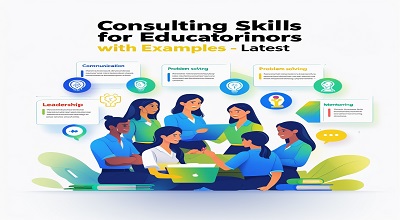Consulting Skills for Educators
Consulting Skills for Educators: In today’s rapidly evolving educational landscape, educators are increasingly required to adopt consulting skills to enhance their teaching effectiveness, support student success, and collaborate with colleagues. The Consulting skills empower teachers to analyze problems, develop strategic solutions, and communicate effectively with stakeholders.
What Are Consulting Skills in Education?
Consulting skills refer to a set of competencies that enable educators to analyze challenges, develop solutions, and facilitate positive change in their classrooms, schools, or districts. These skills are borrowed from the business consulting world but are adapted to fit educational contexts.
Key aspects include:
- Diagnosing issues (e.g., low student engagement, curriculum gaps)
- Strategic planning (e.g., improving lesson delivery, integrating technology)
- Stakeholder collaboration (e.g., working with parents, administrators, and peers)
Why Do Educators Need Consulting Skills?
Modern education demands more than just subject-matter expertise. Teachers must:
- Address diverse learning needs
- Navigate policy changes
- Improve institutional effectiveness
- Enhance professional development
Consulting skills help educators transition from traditional teaching roles to becoming change agents in their schools.
Key Consulting Skills for Educators
A. Active Listening
Definition: Fully engaging with students, parents, and colleagues to understand their perspectives.
Example: A teacher listens to a struggling student’s concerns and adjusts teaching methods accordingly.
B. Problem-Solving & Critical Thinking
Definition: Identifying root causes of educational challenges and developing solutions.
Example: A school team analyzes why math scores are low and implements targeted interventions.
C. Effective Communication
Definition: Clearly conveying ideas, expectations, and feedback.
Example: A teacher presents a new teaching strategy to colleagues in a staff meeting.
D. Data-Driven Decision Making
Definition: Using assessment data to guide instructional improvements.
Example: A teacher reviews student performance trends and modifies lesson plans.
E. Collaboration & Stakeholder Engagement
Definition: Working with parents, administrators, and community members to support student success.
Example: A teacher organizes a parent workshop on digital literacy.
F. Adaptability & Innovation
Definition: Adjusting to new teaching methods and technologies.
Example: A teacher integrates AI tools to personalize student learning.
Examples of Consulting Skills in Action
Case Study 1: Improving Student Engagement
- Problem: Students are disengaged in science classes.
- Consulting Approach:
- Conduct surveys to identify disengagement causes.
- Introduce hands-on experiments and gamification.
- Monitor progress and adjust strategies.
Case Study 2: Curriculum Redesign
- Problem: Outdated curriculum fails to meet 21st-century skills.
- Consulting Approach:
- Collaborate with industry experts.
- Integrate project-based learning.
- Train teachers on new methodologies.
How to Develop Consulting Skills as an Educator?
- Professional Development Workshops
- Peer Mentoring & Coaching
- Self-Reflection & Feedback
- Online Courses (e.g., Coursera, edX)
Challenges in Applying Consulting Skills in Education
- Resistance to change among staff
- Limited resources
- Time constraints
Future Trends in Educational Consulting
- AI-driven personalized learning
- Increased focus on social-emotional learning (SEL)
- Global collaboration among educators
Conclusion
Consulting skills equip educators to become proactive problem-solvers, effective communicators, and innovative leaders. By mastering these competencies, teachers can drive meaningful improvements in student outcomes and school systems.
FAQs
Q1: What are the most important consulting skills for teachers?
A: Active listening, problem-solving, data analysis, and collaboration are crucial.
Q2: How can consulting skills improve classroom management?
A: By diagnosing behavior issues and implementing tailored strategies.
Q3: Can consulting skills help in parent-teacher meetings?
A: Yes, they enhance communication and problem-solving with parents.
Q4: Are consulting skills only for administrators?
A: No, all educators can benefit from these skills.
Q5: Where can I learn more about educational consulting?
A: Websites like teacheducator.com, Coursera, and professional development programs offer resources.
Free Here: Space Shooter MOD APK
